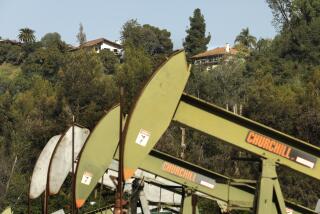Panel OKs Offshore Drilling for Gas
- Share via
WASHINGTON — Clearing a path for energy exploration near the shores of Florida, the House Appropriations Committee voted Wednesday to allow drilling for natural gas in the Outer Continental Shelf starting in 2012.
The committee action, on a 37-25 vote, sets up another confrontation over energy policy when the bill comes before the full House, perhaps as early as next week.
“Today’s vote in Congress represents the most far-reaching and damaging attack on Florida’s coastal protections against offshore drilling that we have ever seen,” said Mark Ferrulo, director of the Florida Public Interest Research Group, an environmental advocacy group based in Tallahassee.
Drilling proponents said the vote was a boon to domestic production of fuels and represented a major change in the nation’s long debate over energy policy.
“The burden has now shifted onto those who oppose the safe production of domestic natural gas to explain to the American people why this country should continue to lock up vast reserves of energy while homegrown industries and the American consumer class continue to pay the highest prices in the world,” said Rep. John E. Peterson (R-Pa.), who sponsored the drilling provision.
The provision, which would allow drilling as close as three miles from shore, was added to a larger spending bill for Interior Department programs, which must still be approved by the Appropriations Committee before it goes to the full House.
The Senate has yet to consider the provision. Senators from oil-producing states are pushing a separate bill that would allow drilling for oil and gas up to 100 miles from the Florida coast. Florida members are proposing an alternative that would create a 150-mile buffer all around the state’s shores.
Peterson’s provision would allow production in California and Florida and all along the Outer Continental Shelf, but only for natural gas, not oil. He contends that drilling for natural gas is relatively clean and that a boost in domestic production would make a major difference in prices in regional markets.
The provision does not affect the current presidential ban on drilling for oil or gas in the eastern Gulf and other offshore areas, which would remain in effect until it expires in 2012.
Ferrulo and members of the Florida congressional delegation contend that drilling stirs the sea bottom, creating pollution and threatening habitat. A rig drilling for natural gas is just as likely to strike oil, risking a major spill, critics say.
“This is a dangerous game they are playing, placing gas rigs in the middle of Hurricane Alley,” said Rep. Mark Foley (R-Fla.). “Instead of placing our state’s beaches and tourism in danger, we should be tempering our dependence and finding alternative sources of fuel.”
More to Read
Sign up for Essential California
The most important California stories and recommendations in your inbox every morning.
You may occasionally receive promotional content from the Los Angeles Times.










